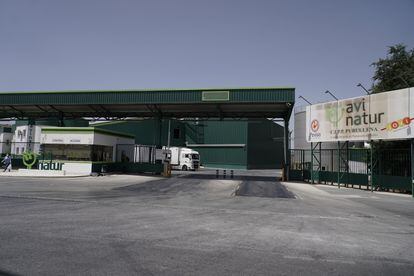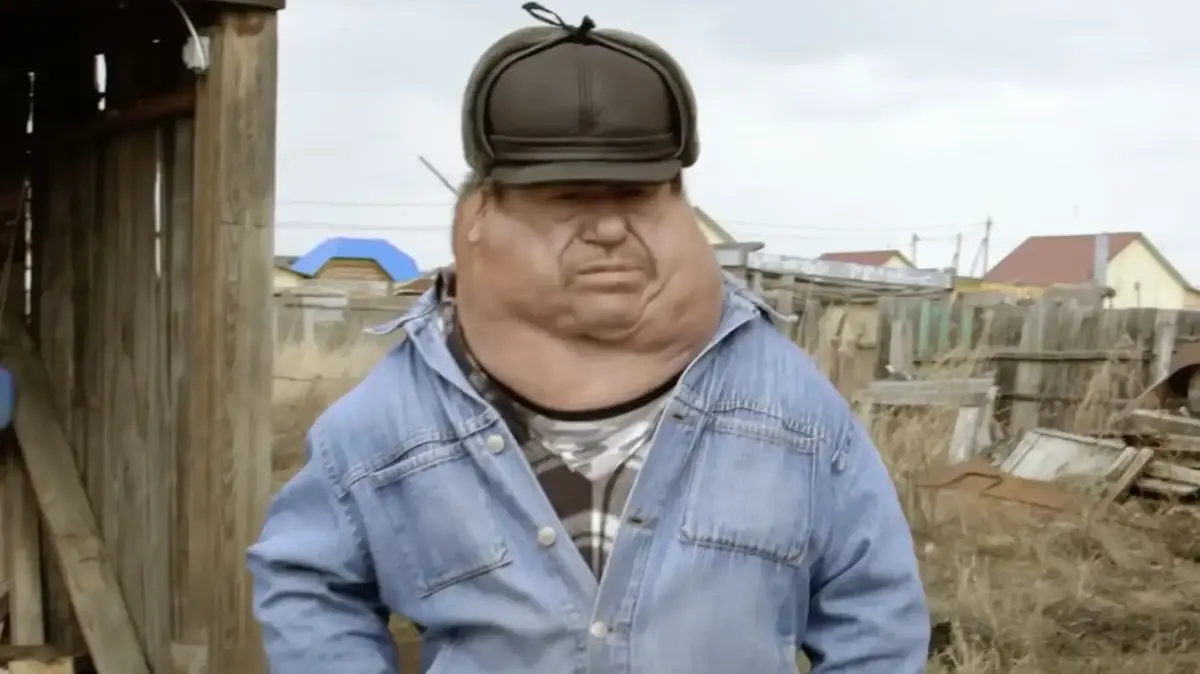On the banks of the Fardes River, Ana Fernández Sevilla (41 years old) recalls her childhood: “The river was a paradise.
We used to play in the water in the summer when we were little.
It was full of fish, you could even drink the water”.
María Eugenia Bayot (65) remembers it as “wonderful”.
“The residents of El Bejarín [a district of 249 inhabitants in Granada] came in the summer to spend the day.
The children bathed and there were even ducks”.
Now no one bathes.
“El Fardes went to hell when they installed the chicken slaughterhouse further upstream in the 1990s, which has dumped its waste into the river for years.
There are no more fish, there is nothing.
It smells very bad and often comes down with traces of blood”, says Francisco Ruiz, 62, very angry.
This agricultural industry, which employs more than 700 people in an area with around 22% unemployment,
It is the object of anger for many residents of El Bejarín.
It is called Avinatur and its main client is the Mercadona supermarket chain.
Avinatur sources deny that the plant dumps untreated waste into the Fardes river.
They declare themselves "convinced" that they have nothing to do with the reddish remains that travel with the water or with the bad smell.
The company's argument to justify this position is that they have a sewage treatment plant "that is monitored" and that has been in operation since the new ownership took over the activity of the plant, in 2015. "We can safely say that we comply with current regulations.
We are very committed to the environment”, add the same sources.
Regarding contamination in previous years, the company assures that it has complied with all regulations since it acquired the slaughterhouse, which opened its doors around 1995, then called Avigenil.
However, this newspaper has witnessed that type of spill and has appreciated that bad smell on several occasions after 2015. Neighbors share that impression.
“Of course there have been discharges after they installed the sewage treatment plant.
Just a couple of years ago I was plastering a farmhouse and to get there I passed through a boulevard where the water flowed down like a river of chicken blood”, adds Ruiz.
Bruno Martínez, 34, has recently witnessed the same scene: “I like to go hiking and when I go into the river I see curds of blood and foam.
They have loaded the river.
You don't see red or brown every day, but it is common."
This video collects recordings of the state of the river course and some of its ditches in recent years.
00:59
Images of the discharges in the river
There are no other industrial plants near El Bejarín that work with organic matter to the extent that Avinatur does, which claims to slaughter 650,000 chickens every week.
However, in its 2021-2025 expansion project, the Aviserrano group (of which Avinatur is a part) indicates that the "current" production of the plant is 800,000 chickens per week, with the aim of increasing it by 150,000 more.
The last integrated environmental authorization of the company collected on the portal of the Ministry of the Environment of the Andalusian Government contemplates the slaughter of 646,154 birds per week.
The company refuses to explain this gap.
In 2020, Avinatur was the fourth largest chicken-producing company in Spain, according to the Alimarket Sector Report.
“There has been degradation of the Fardes River since this slaughterhouse existed, of course, because it has been pouring for many years and although it is now being improved, the damage has been done.
Before there were fish and there are no more (...) There have been many years of many irregular discharges.
It was poured directly into the river”, explains the socialist José Luis Martínez, mayor of Purullena (2,320 inhabitants), the municipality in which the slaughterhouse is located and on which the district of El Bejarín depends.
He adds a nuance in favor of the company: “We detect that they are becoming more exhaustive in debugging.
Can there be irregular discharges due to breakdowns?
Well, occasionally there may be.
They may not be perfect."
Martínez believes that the legacy of the company in the area “is not bad”: “In this area, with such a high unemployment rate,
Avinatur entrance gate at the Purullena entrance. Iván M. Ariza Molero
The company defends itself against the accusation of degrading the river by pointing out that, while it pours purified water into the Fardes, Purullena (and other municipalities in the area) does not treat the sewage that also ends up in the river course.
“No municipality in the area has a sewage treatment plant, loaded with organic matter, that ends up in the Fardes River.
Therefore, we believe that the accusation is unfounded, ”says the company by email.
One of the former mayors of Purullena, Paco Ruiz
Tani,
rejects that argument: "The faeces are insignificant compared to the amount that Avinatur pours."
He explains that the water from the sanitation network has been discharged into the river since 1975, when the Fardes was in good health despite the fact that the population was older.
Until the installation of the slaughterhouse in the nineties, the neighbors did not notice a worsening of the state of the river.
“Water purification in municipalities with less than 5,000 inhabitants is the responsibility of the Junta de Andalucía.
We hope that in 2023 work will begin on a treatment plant for Purullena and other towns in the area”, adds the current mayor.
Avinatur presents itself on its website as "Mercadona's integrated supplier of fresh chicken", despite the fact that the company of Valencian origin no longer recognizes that title to its main suppliers.
Slaughterhouse sources acknowledged in a first phone call that Mercadona is their "main" client.
Later, by email, when asked about the percentage of production that Mercadona acquires, they pointed out that "this information is not relevant to the study that is being carried out."
In 2018 they recognized that 75% went to Mercadona.
Sources from the supermarket chain indicate the following: "Mercadona has more than 1,500 suppliers and in chicken we work with five suppliers who in turn have more than a dozen factories, including Avinatur."
Several neighbors on the Luchena bridge, in El Bejarín. Iván M. Ariza Molero
In the absence of a treatment plant in Purullena, the Guadalquivir Hydrographic Confederation regularly "inspects" the waters of the Fardes.
Sources from the body in charge of ensuring the health of the waters assure that they have detected "sometimes" organic remains "typical of the activity of a poultry slaughterhouse."
The confederation regularly sanctions Purullena for not purifying its waters.
“The Water Quality Area proposes increasingly large fines, as well as a notable increase in the amount of the discharge control canon that the municipality must pay annually, since the volume of wastewater generated has been included in the calculation of said canon. by the aforementioned slaughterhouse”, they add from the confederation.
Sources from the Ministry of the Environment explain that "several inspections have been carried out on the company and deficiencies are detected that, if they are corrected in time, do not usually motivate the opening of disciplinary proceedings."
The same sources explain that there are three open sanctioning files corresponding to 2021 for non-compliance with the integrated environmental authorization, "pending information from the company."
The Board only details one of those files: for expansion of the slaughterhouse.
judicial aspect
One of the residents of El Bejarín who has confronted Avinatur the most is Ricardo Rueda (54 years old), professor of Private International Law at the University of Granada.
“A boulevard passes through my farm in El Bejarín where I have seen everything come down: viscera, coagulated blood remains, feathers... It is an unbearable stench.
They have destroyed the ecosystem of the river that made us so happy”.
He reported the case to Seprona in 2015. The Investigating Court number 1 of Guadix dismissed the case, but reopened it in 2016 due to a report from the Toxicological Assessment and Environment Service of the National Institute of Toxicology and Forensic Sciences, which studied the discharges of Avinatur (already with the new property in front).
This was his conclusion:
"The samples from the manhole and the discharge point indicate insufficient purification to achieve good ecological status of the waters, it poses a serious risk to the natural ecosystem and prevents the use of irrigation water and as recharge of lagoons."
Avinatur claims to ignore this report.
Images of the river and its boulevards and ditches between 2020 and 2022. Courtesy of Ricardo Rueda.
“The issue has been in preliminary proceedings for six years.
I don't know how to explain why it costs so much.
Avinatur appeals absolutely everything, which greatly delays the process.
No statement has yet been taken from the head of the company.
I think there is an unjustifiable delay on the part of the Prosecutor's Office and the court," says Rueda's lawyer, Alfredo Ruiz.
Sources from the Superior Court of Justice of Andalusia confirm that the investigation has already finished and that it has been delayed due to the resources and the "complications" in the preparation of expert reports.
Ecologists in Action has appeared as a popular accusation.
“It is a river very punished by this company, Avinatur.
It was beautiful and now it's disgusting to go through there", criticizes José Antonio Cabrera, lawyer and spokesman in Andalusia for the environmental group, who also charges Mercadona as the plant's main client: "I cannot understand why Mercadona, such a powerful and so concerned about her social image, she does not insist on solving this problem”.
"All those discharges from Avinatur go to the Fardes and end up in the Guadalquivir," adds Cabrera, who denounces the "little control" that, in his opinion, there is in Spain over large livestock productions.
“It is the usual problem: you put in a macro-industry that destroys the environment but that generates employment in a very depressed area.
On July 13, shortly after this newspaper contacted the court to find out about the situation, the judge issued an order that continues the process.
"In case the facts investigated to Avinatur constitute an alleged crime against the environment, transfer it to the public prosecutor's office and to the accusations in person so that they formulate a prosecution letter, requesting the opening of an oral trial or the dismissal of the case. ”, indicates the text.
Rueda's lawyer and that of Ecologistas en Acción confirm that they are continuing their legal fight against Avinatur.
Sources from the Environment Prosecutor's Office point out that the car is still pending study, but the most foreseeable thing is that the opening of an oral trial is required.
Stench
Beyond the municipal and judicial discussion, this debate passed by the Andalusian Parliament in 2016. The then deputy of Podemos Andalucía Mercedes Barranco asked about the issue in an Environment commission, after visiting the Fardes River at the request of the neighbours.
“I have seen many wastewater problems, but what I saw in El Bejarín was something else.
It was vomiting.
A terrible stench.
It was a continuous discharge of reddish waters.
They were clearly waste from the slaughterhouse,” says this environmentalist.
Then months ago the new property had taken over Avinatur and its treatment plant was working.
“The issue did not go further because Mercadona and the company told me that a new treatment plant was under construction to solve the discharges.
However, a few months ago the neighbors called me to tell me that the problem had returned”, comments the former Andalusian parliamentarian.
In 2016, the Ministry of the Environment approved a new integrated environmental authorization, which increased the capacity of the plant from half a million chickens slaughtered per week to 646,154.
The problem that Barranco alludes to is the same one that the neighbors complain about.
"The river smells rotten," says Fernández Sevilla.
Beatriz Tejada, 30, adds: "It smells like dead chicken
. "
"The factory is very good because it provides many jobs, but they must do things well, that the water they throw into the river is purified," says Martínez.
"We can't continue like this," criticizes Manuel Huete (63), president of a farmers' association in the area.
The symbol of El Bejarín is the peach, the fruit that gives its name to the summer festivals.
“I don't want our peaches to be irrigated with water contaminated by the slaughterhouse.
El Bejarín is an oasis in the middle of the desert, with a stream of water that is the Fardes river.
If we lose it, this becomes a graveyard.
The degradation of the environment accelerates the depopulation of rural areas”, says an angry Rafael Porcel, 30 years old.
He chats while walking in the shade of perfectly aligned poplars, the crop that best exemplifies the agricultural decline of El Bejarín: the logging plots of this tree, which hardly generates employment, have gained ground for peaches and vegetables.
"I don't think that the best thing for these crops is to grow with this crap," Porcel concludes.
Aerial view of the Fardes river. Iván M. Ariza Molero
You can follow CLIMA Y MEDIO AMBIENTE on
and
, or sign up here to receive
our weekly newsletter
50% off
Subscribe to continue reading
read without limits
Keep reading
I'm already a subscriber




/cloudfront-eu-central-1.images.arcpublishing.com/prisa/TY47FSPP2RB4BEVHHZRVRO4QLY.jpg)






/cloudfront-eu-central-1.images.arcpublishing.com/prisa/KMEYMJKESBAZBE4MRBAM4TGHIQ.jpg)


